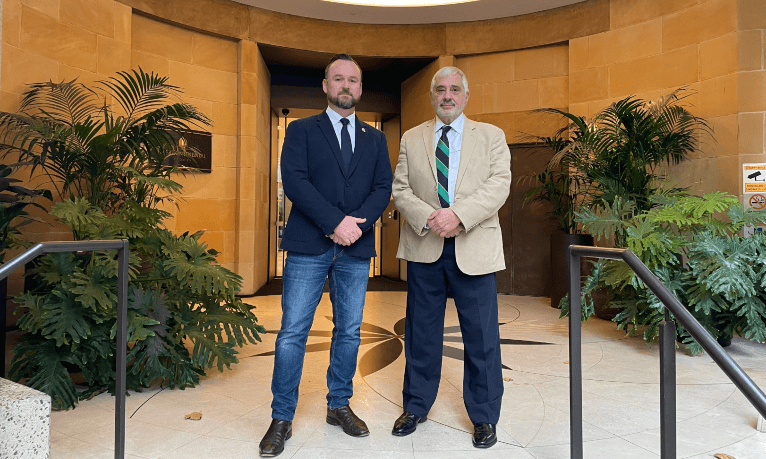DVA claim Q&A: Lou Cunningham

When Lou Cunningham transitioned out of Army Reserves in 2020, he’d spent five years on his DVA claims, to no avail, and the process was placing enormous stress on Lou and his wife Barbara. We spoke with Lou about his experience, where he’s found support, and how he’s dealt with the bureaucracy and admin of veterans’ affairs.
At a glance:
- Lucien (Lou) Cunningham transitioned out of Reserves in 2020 after 47 years of service, and still volunteers regularly.
- Lou’s service included Kangaroo deployments, two FPDA deployments and six months in Timor.
- He started DVA claims in 2015, while still serving, and in 2021 started working with a DefenceCare advocate.
- “No one should take on the DVA by themselves – you’ve got to have an advocate,” Lou says.
Q: Tell us about your service.
I joined the Reserves in 1973 and had 47 years service in a number of Corps, including Service Corps, Air Dispatch, Infantry Corps and finally Intelligence Corps. I saw a lot of changes over the years, a lot of units go – a drawdown in capabilities in many ways. I was primarily based in units in Sydney, I did a couple of Kangaroo deployments, two FPDA deployments to Butterworth and Singapore, and I did six months service in Timor in 2008.
Q: When did you transition out of Defence?
I transitioned out on 28 February 2020 – my legs were going. Everytime I went to an infantry posting I’d damage a leg, damage a foot, damage an arm – you would carry a heavy pack, and when you’re a platoon commander you carry an even heavier pack, contrary to popular opinion!
I had a number of issues with my feet, which eventually had led to permanent nerve damage in both of them, as well as problems with my knees, legs and back.
Q: Where did you first get help with your DVA claim?
I started with my DVA claims in 2015 before I left – I went up to Holsworthy and was put onto the Vietnam Veterans’ Association who had an advocate up there, but she then began working for the DVA. I then worked with another advocate and he was good.
With that advocacy I did have some offers for claims, but I had no idea whether they were good or not. It’s all very difficult with DVA because you’re dealing with so many different departments – Perth, Brisbane, Melbourne, Canberra – and there’s no one point of contact.
When DVA transitioned to the new advocate system, Ken retired and I was alone. I couldn’t get anyone to even reply to a call or an email for five months.
The problem then was that I was being discharged, and I was trying to sort everything out – it’s far more difficult to do when you’re no longer actively involved.
I was desperate, I needed assistance, and the stress was affecting my wife Barbara and I terribly. The impact on partners is often overlooked, but it’s huge.
Q: How did you get in touch with a DefenceCare advocate?
In 2021, I was put in touch with RSL DefenceCare through my RSL sub-Branch at Ingleburn. DefenceCare told me someone would ring me within 48 hours, and they did – that’s how I was connected with John Parker. He said, ‘Lou, I’ll run it’, and he’s been brilliant.
He was able to tell me if something was a good offer or not, he identified gaps in paperwork that we should fill in to complete the claims, and he’s really fought my corner every step of the way. His knowledge is fantastic. The DVA has more than 1,000 forms – I’ve been subject to countless occasions of ‘oh, that’s the wrong form’ – but John helped guide us through that and we couldn’t have done it without him. He’s been a godsend.
Q: What advice would you give to anyone lodging a DVA claim?
First and foremost, work with RSL DefenceCare from the outset!
You really have to start your claims well before you leave the service, and that’s particularly critical for Reservists, because once you’ve left it’s very difficult to get access to anything. We don’t have the formal transitioning cycle that the regular Army has, so there’s a real issue in accessing records and the like.
If you’re a Reservist and you’re being told you’re getting moved to the standby, get all of your claims in before they do it. No one should take on the DVA by themselves – you’ve got to have an advocate.
Q: What have you done since leaving Defence?
Transitioning out is a huge thing – you have to plan for it. I was lucky in a sense that one of the Reserve Commanding Officers said, ‘We don’t want to lose your skillset’, and suggested I become a volunteer.
I volunteer one night a week as a Defence Assistance Helper in the cadets, I do one day a week at the Royal United Services Institute and I volunteer at the new Scheyville Military Heritage Precinct near Windsor.
Other than that, nine grandchildren keep me very busy!
RSL DefenceCare is part of RSL LifeCare, our charity partner – last year, we donated $2.1m to support RSL LifeCare’s important work.
Current and ex-serving Defence personnel, as well as family members and spouses of veterans, can access RSL LifeCare and RSL DefenceCare assistance here, or through a local RSL sub-Branch.







